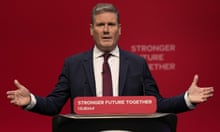Keir Starmer has been forced into a U-turn on major plans for party reform after an internal row ahead of the Labour conference, but has done a deal with unions for changes that will raise the bar for nominating leadership candidate.
After a fierce battle in which his proposals were dismissed by key figures including his deputy, Angela Rayner, and the Scottish Labour leader, Anas Sarwar, Starmer abandoned plans to bring back an electoral college system, which would have given MPs much greater sway over votes on the party’s future leader.
Instead, the party’s ruling national executive endorsed plans to ensure any potential leadership candidate needs a minimum of 20% of MPs to nominate them before they reach a ballot of members. Starmer had originally proposed 25%, but agreed to lower the bar even further during discussions.
Starmer will agree to retain the one-member one-vote system but candidates will now need 20% of MPs to nominate them to reach the ballot that goes to members. Under Jeremy Corbyn’s leadership, that threshold had been lowered to 10% though endorsements from local parties and unions were also needed.
The party will also abolish registered supporters and put a freeze date on membership before the start of any contest.
“The aim of the reforms was to ensure that leadership elections are not decided by people who have only joined with the express intention of backing a candidate and have no other relationship with the party,” one Labour source said.
After the vote at the NEC, which was passed by 22 votes to 12, Starmer said: “I’m very pleased these party reforms have got the backing of our NEC. These proposals put us in a better position to win the next general election and I hope constituency and trade union delegates will support them when they come to conference floor.”
Mish Rahman, a Momentum-backed member of Labour’s NEC who opposed the changes, said: “Changing the threshold like this will destroy the right of ordinary people to shape the future of the party. If this rule change passes, Labour will be well on its way to becoming the party of the Westminster elite. If the 20% threshold applied to the 2020 leadership election it would have been a contest between Sir Keir Starmer QC and Sir Keir Starmer QC.”
The changes will now be voted on by Labour party members and trade union delegates at the party conference on Sunday.
The Guardian understands Starmer has also agreed to look at how more trade union members can be given the vote in leadership elections, including those who pay the union’s political levy, which could give another 2.2 million people the right to vote in leadership elections.
Allies of Rayner have been furious that key announcements on workers’ rights during her media appearance on Saturday morning have been drowned out by relentless questions on internal warfare.
Rayner, the shadow secretary of state for the future of work as well as Starmer’s number two, has privately made clear that she would like the conference to focus instead on attacking the government and setting out Labour’s offer to the country.
Others who had publicly expressed reticence at the proposed reforms included the London mayor, Sadiq Khan, the mayor of Greater Manchester, Andy Burnham, and the Scottish Labour leader, Anas Sarwar.
Rayner will set out plans at the party’s annual conference later on Saturday for fair pay agreements aimed at strengthening workers’ bargaining powers, particularly in sectors plagued by low pay and insecure contracts.
The policy, which echoes an approach recently adopted in New Zealand, would introduce government-backed negotiations between unions and employers across an entire sector, rather than firm by firm. These would set minimum pay rates and basic conditions, which would then become a mandatory “floor” across the sector.









